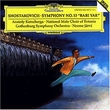| All Artists: L.V. Beethoven, Wilhelm Kempff Title: Beethoven: The Complete Piano Sonatas Members Wishing: 0 Total Copies: 0 Label: Dg Imports Original Release Date: 1/1/2002 Re-Release Date: 5/8/2002 Album Type: Box set, Import Genres: Special Interest, Pop, Soundtracks, Classical Styles: Vocal Pop, Opera & Classical Vocal, Chamber Music, Forms & Genres, Sonatas, Historical Periods, Baroque (c.1600-1750), Classical (c.1770-1830), Modern, 20th, & 21st Century, Romantic (c.1820-1910), Instruments, Keyboard Number of Discs: 8 SwapaCD Credits: 8 UPC: 028944796629 |
Search - L.V. Beethoven, Wilhelm Kempff :: Beethoven: The Complete Piano Sonatas
 | L.V. Beethoven, Wilhelm Kempff Beethoven: The Complete Piano Sonatas Genres: Special Interest, Pop, Soundtracks, Classical
|
Larger Image |
CD DetailsSimilar CDs |
CD ReviewsHistorical recordings MLao | 11/15/2004 (5 out of 5 stars) "This boxed set was released to celebrate Wilhelm Kempff's 100th birthday, and it is simply gorgeous. It consists of the complete piano sonatas recorded in 1951-56 (in very good quality mono) by one of the supreme interpreters of Beethoven.Listen to the first movement of the "Pathetique" and you feel transported to the 1950s, with all of the nostalgia that characterizes memories of the post-war Germany. On the third movement of the "Moonlight" sonata, you hear Kempff at his peak. Of all the versions I have heard, including Kempff's stereo recording, this must be the most energetic and exciting one.The packaging is tasteful and sobre, and contains several pictures of the musician. This set comes with a booklet and bonus CD of Kempff expressing himself on various topics, ranging from Hiroshima to his interpretation of Beethoven's music. I wish all of Deutsche Grammophon's Collector's sets were as well documented and nicely packaged as this Dokumente boxed set.This is a piece of history and a definite must have for any classical music listener. I recommend you buy this boxed set in conjunction with a more modern interpretation, for example Ashkenazy's cycle on Decca or Brendel's digital set on Philips. However, if you could get only one set, you'd be hard pressed to find a better cycle of Beethoven's piano sonatas than this one." A fantastic cycle... Chris Chamoun | 04/13/2007 (4 out of 5 stars) "Wilhelm Kempff is most certainly among the most humane pianists in recorded history. This cannot be denied - even apart from his luminescent interpretations, you will hear him play a Bach chorale on the organ in the Church of Peace at Hiroshima on the bonus disc of this cycle. Sibelius once told him that he did not play "like a pianist, but like a human being". From his personality, one may already see what to expect in his playing... First I'll get through his late sonatas. I am one of the few people I know of who is neither absolutely enthralled nor put off by his renditions of the final five sonatas. The last five of Beethoven's are works almost infinite in their range of emotion, spirituality, and even technicality, and no pianist I have ever heard plays all five of them equally well. As for Kempff, I notice two big keys in the way he plays them, one positive and one not so much. Bad news first: When it comes to the slow movements, he simply plays them too fast and too lightly. While he lets every note ring out beautifully, he does not allow his listener time to soak in the slower parts, such as the beginnings of the final movements of Op. 109 and Op. 111 as well as (and much more imporantly so) the adagio in Hammerklavier. This Adagio is undeniably a masterpiece - it goes through periods where it floats along pensively and wistfully to points where it bleeds with dark eroticism. Kempff's adagio has credit as a nocturnal whisper, but I do not feel it fully captures these elements of that work, mostly because of the speed at which he plays it (only about 15 minutes long, as opposed to its average length of about 17 - 19 minutes). However, Kempff's luminenscence provides us with an almost unique experience in many other parts of the late Beethovens... he almost seems to capture in his playing of certain parts the hours Ludwig spent at the keyboard improvising until he was content with what he heard. The fugues of Op. 110 and Hammerklavier, as well as the variations in Op. 111 are so magnificently and brightly portrayed, that it is impossible for me not to be taken by them every time I hear them. As for the middle period sonatas (in my view those are Nos. 12 - 27 with the exception of Nos. 19 & 20 which were written much earlier than they were published, though most academics start the middle period at No. 21), I have not a single complaint with Kempff. These sonatas do not share the same spirituality as the late ones do, instead they are the product of a unity of Beethoven's fertile mind and soul... the middle work portrays Beethoven's dreams and fantasies put to music, for example the Waldstein sonata starts out playful and almost bluesy and ends in a flash of sparkling divinity; Sonata No. 12 begins pensively before sinking into the strange darkness of its funeral march and ending on the waterfalls and moonlit plains of its quick finale. Considering the dreamlike and ever-changing spirituality of these works, it is clear that few are apt to play them better than Kempff does, and I would have paid the price of this cycle for Nos. 12, 15, 21, and 24 alone! In terms of the early sonatas, they are not as similar to Mozart as many will have you believe, though they do have their share of Mozartine moments. However, one of the reasons that they are seen as in line with the work of the 18th century classical composers is because of the way in which they should be played. These sonatas are like Beethoven's childhood dreams as opposed to his adulthood ones represented by the middle sonatas, and should be played with smooth flow and great intensity, where it is required (for example in the opening movement of Pathetique or Op. 10/1). In this case, Kempff's renditions do not bother me, but do not excite me either, and I must admit I rarely listen to the first two discs of his cycle... look to Emil Gilels, Solomon Cutner, or even Artur Schnabel for better interpretations of these early sonatas. On the whole, this cycle is one of the best I own and the lovely box is already showing signs of serious wear and tear after only a year of ownership (I carry it around with me quite a lot), and I would even recommend it as a starter cycle for someone not well acquainted with Beethoven's sonatas. For the early sonatas, look for the pianists I listed above (as well as Grigory Sokolov for Sonata No. 4, unfortunately he has only recorded two Beethoven sonatas in his life). For different (and in some cases better) perspectives on the last five, I'd recommend Maurizio Pollini (ESPECIALLY for Hammerklavier), Stefan Kovacevich, Alfred Brendel (mostly for Op. 109), Claudio Arrau, and many others... All in all, this cycle definitely has my enthusiastic recommendation." A musician rather a pianist! Hiram Gomez Pardo | Valencia, Venezuela | 08/04/2005 (5 out of 5 stars) "In an occasion Cortot played the first movement before the astute regard of the legendary pianist Anton Rubinstein: He told him those indomitable words: "Beethoven's piano music must not be studied. It must be reincarnated.". That incisive but smart statement has to do with a grief comment of Menuhin on 7th December 1954 about Fürtwangler: "Each time he conducted a work of Beethoven, he accomplished a sacred rite."
Nowadays the most of pianists lack of temperament. It seems they are afraid to think. They do everything in order not to think. Man has lost his instincts-has lost contacts with himself. According these Kempff wisdom observations talk by themselves. "Each of us, ultimately has something like a motor in the soul and is born with an individual range of expression, and it is up to us to realize that range" The whole fulfillment of Kempff every time he played Beethoven's music would seem that assertive observation of Fürtwangler: "I could only conduct when the music sounds beautiful" Having in mind Kempff's towering musicality, one convinces oneself about his honesty and craftsmanship: And it works out with every composer he played: Schumann, Schubert, Bach and Liszt. He played without apparent effort, without searching boasts of pianist pyrotechnics or theatrical effects to get gallery's applauses, but under himself and in the service of the composer. Buy this set; because sometimes the words seems to stain the best intentions and many times insufficient to express the absolute rapture state and total commitment of certain musicians of the highest level. " |

 Track Listings (120) - Disc #1
Track Listings (120) - Disc #1
![Carl Loewe: Balladen & Lieder [Germany]](https://nationalbookswap.com/cd//m/04/0204/6150204.jpg)